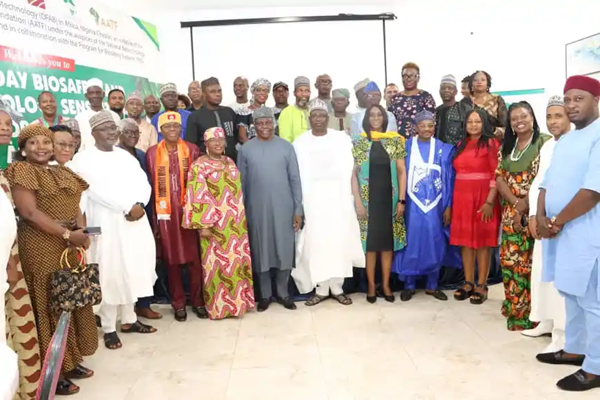
The director-general of the National Biotechnology Research and Development Agency (NBRDA), Prof. Mustapha Abdullahi has called on Nigerians, especially farmer associations, to leverage the tools of science to empower farmers, enhance their productivity and contribute to the socio-economic development of our nation.
Speaking during a one-day Biosafety and Biotechnology Sensitization Workshop for Farmers Associations with the theme “Empowering Farmers Through Biotechnology: Enhancing Agricultural Productivity and Sustainability” in Abuja, he posited that biotechnology stands as a beacon of hope, a transformative force driving agricultural progress across the globe.
He said: “Today, we stand at the threshold of a new era where scientific advancements intersect with agricultural sustainability, productivity and resilience. In this journey, farmer associations like yours play a pivotal role as the bedrock of our agricultural landscape.
“The benefits of biotechnology are vast and profound, offering solutions to some of the most pressing challenges facing our agricultural sector. From enhanced crop yields and improved nutritional content to resilience against pests, diseases and adverse environmental conditions, biotechnology offers a spectrum of opportunities to propel our agricultural productivity to new heights.
“Moreover, biotechnology fosters sustainable agricultural practices, reducing the dependency on harmful chemical inputs and promoting ecological balance. By harnessing the power of biotechnology, we not only safeguard the livelihoods of our farmers but also ensure food security for our nation,” he stated.
In his goodwill message, the African Agricultural Technology Foundation (AATF) regional representative for West Africa, Dr. Jean Baptiste explained that the forum marks a significant milestone in the collective efforts to empower Nigerian farmers with knowledge, resources, and innovative solutions that will drive sustainable agricultural development across the nation.
“Agriculture is not merely a livelihood; it is a noble calling, a cornerstone of our economy, and a pathway to food security, economic empowerment and environmental sustainability. Each one of you, as farmers, stewards of the land and custodians of our agricultural heritage, plays a pivotal role in shaping the destiny of our nation’s agricultural landscape.
“Through this sensitisation programme, we aim to equip you with the knowledge, skills and resources necessary to overcome challenges, seize opportunities and harness the transformative power of technology and innovation in agriculture. Together, we will explore best practices, exchange ideas and chart a course toward greater resilience, productivity, and prosperity on your farms,” he stated.
Baptiste assured of AATF’s commitment to supporting farmers every step of the way, adding that the foundation would keep advocating for policies that foster an enabling environment for agricultural innovation and facilitate access to cutting-edge technologies and resources that enhance your farming operations.
Earlier, the director of the agricultural biotechnology department at the agency, Dr. Rose Gidado acknowledged that the seed is the nerve centre of agriculture, adding that once you get it right at the seed level, every other thing follows.
She said: “You know that biotechnology seeds are improved seeds with high yields; they are resistant to pests and insects also with high nutrients rich in vitamin A and zinc which is very necessary for pregnant women, lactating mothers and children.
“If you are doing 12 sprays on a particular crop that is susceptible to insects and pest attack, you will now do 2 to 3 sprays and that is a lot because reduction in cost is something because when the cost of production is reduced there will be a profit margin.
“If you are not putting in so much into what you are doing, of course, at the end of the day, the cost of the grain will not be that high,” she added.
“Why are we suffering now,” she asked? “…this is because most of our crop production is actually in deficit and not enough for the over 200 million populations, we produce them in deficit we have cowpea, maize and cotton and they are made through importation and as you know Nigeria spends billions importing.
“By the time we have improved seeds of these crops, there is a lot that Nigeria will gain like in our foreign exchange.”
Speaking for farmers, the national president of the Maize Association of Nigeria (MAAN), Bello Abubakar said the sensitisation workshop would help farmers improve their production and create wealth.
He assured the maize farmers were already looking forward to planting the Tela maize, knowing the benefits of the improved seedlings.
“Majority of our farmers are aware of the new, improved seeds; I can say that about 60 per cent to 70 per cent of our farmers have already accepted it and are ready to cultivate it,’’ he said.
The national president of the Cassava Growers Association, Mustapha Bakano said they were looking forward to enhancing their capabilities to improve stem production and to produce seeds en masse.


